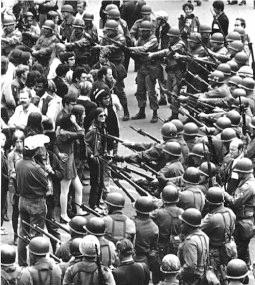A personal and radical history
reviews a new collection of essays that brings to life some of the important countercultural and radical events of the last 50 years.
WHEN I started working at the University of Vermont library my junior year of college, I was only a year and a half removed from my decision to become a self-identified activist and socialist.
One thing that continuously bothered me during those first dozen months or so was the seeming absence around me of any living, breathing connections to the last great social upheaval of the 1960s.
It seemed that people of my parents' generation who had been radicalized and drawn into activism by the civil rights or anti-Vietnam war movements or any number of the other social struggles of that era were somehow not able to make it through the intervening decades with their radical identity or sense of revolutionary purpose intact.
The upshot of this phenomenon was an apparent inability or unwillingness of these radicals to relate their past experiences to younger people with anything other than regret at worst, or coy reluctance at best.
It is for this reason that I became so excited when I discovered that my new supervisor at the university library was that seemingly rare breed of 1960s radical who was not only unafraid to share stories from his halcyon days, but also continued to openly identify as an activist and revolutionary, attending protests on campus and speaking at teach-ins whenever called upon.

Ron Jacobs, the librarian in question, became my source of information for all things radical and countercultural from the 1960s, '70s and '80s. I soaked up these stories like a sponge.
And now all of these stories and more have been compiled into a short memoir that is both informative and, well, fun (if I may be granted the liberty of using this word in reference to an act of reading).
ORGANIZED IN the form of a collection of short vignettes, this eBook covers a life intertwined with the major countercultural and radical political events spanning the past five decades.
Jacobs himself is a sort of embodiment of the combined spirits of Jerry Garcia, Patti Smith and Willie Nelson. The one advantage he has over them, though, is that he is not them, and therefore is able to provide a unique, from-below, "people's history" view of these luminaries' effects on the street culture of the time.
This is Jacobs' gift--his ability to describe world-historic events swirling around him in the simplest, most open-minded and most unfiltered way. Whether describing his youth on a state-of-alert level U.S. military base in Pakistan in the early 1960s, or his years spent in the Bay Area in the early 1970s defending the "People's Park" (a reclaimed community space and site of many battles between the police and authorities on one side, and the local students, workers and youth on the other), Jacobs does a good job of adding a personal touch to historical events, without crowding out the reader's ability to see it for themselves.
Jacobs' complete lack of heavy-handedness is this work's greatest asset and seems to largely be a result of the fact that his life has twisted through so many different circles of people. Indeed, he is someone who truly does defy simple categorization.
When describing his escapades as an itinerant hitchhiker in the mid-1970s, tripping on acid and mescaline and fighting off other knife-wielding wanderlusts, one feels compelled to call him a kind of latter-day hobo. When relating his many encounters with the Grateful Dead, Wavy Gravy or Ken Kesey, he seems to shade into the classic "hippie" characterization.
Then again, Jacobs comes across as nothing if not eminently politically engaged and conscious--from his early days on an American military base in Germany where he organized against the Vietnam War; to his coming-of-age days in Berkeley, Calif., making music and talking politics with Black nationalists and revolutionaries; to his most recent involvement with the May Day 2006 march for immigrant rights in Asheville, N.C., where he now lives.
It should be stressed, however, that this is not a piece intended to primarily provide a political or sociological analysis of past world events. Jacobs' other major work, The Way the Wind Blew: A History of the Weather Underground, is a phenomenal survey of the rise of far-left militant revolutionary groups in the late-1970s, and I would highly recommend it for anyone looking for a more explicitly historical treatment of this period.
This is not to say that there is nothing offered in Tripping for the history buff or those interested in learning more about the post-1960s countercultural left. Nonetheless, this work is much better suited for someone looking for an entertaining "quick-read" with a format specifically suited well for intermittent reading or reading-on-the-go, and a predilection for alternative music, drugs, lifestyles and politics.


